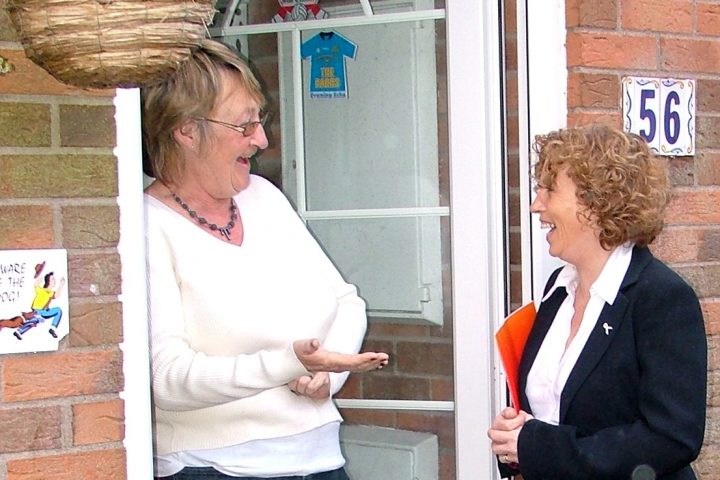
In the wake of state-mandated social distancing guidelines, Utah political candidates have abandoned traditional canvassing strategies.
SALT LAKE CITY — For political candidates in Utah, this campaign season is anything but politics as usual.
“Public health is more important than politics,” said Democratic Congressional candidate Jamie Cheek of Odgen, announcing that her campaign has cancelled all face-to-face events and outreach efforts in order to comply with state guidelines for social distancing to slow the spread of the Coronavirus. “The health and safety of all Utahns has always been and will remain our top priority.”
GOP candidate Tina Cannon of Mountain Green echoed that sentiment, saying that “ … social distancing is a challenge that we just have to accept. The hardest part of meeting that challenge is our inability to have excited volunteers out spreading a grassroots message through face-to-face meetings.”
In addition to disrupting events that have traditionally served as campaign milestones, the threat of the Coronavirus has also choked off the legal loophole that many candidates were relying upon as a shortcut to the state’s primary ballot.
“This is going to be a very different type of election season,” says Utah Democratic Party Chairman Jeff Merchant, in what may be the understatement of the year.
Caucus night for Democrats and Republicans passed without fanfare on Tuesday, because both parties had previously cancelled or postponed their precinct gatherings due to the threat of the Coronavirus.
Those caucus events normally select delegates to attend the parties’ state conventions, but both Republicans and Democrats unilaterally decided that delegates elected in 2018 will just continue to serve during this election cycle.
But even the upcoming state party conventions, traditionally held in April, are now uncertain.
In lieu of its traditional mass meeting of previously-selected delegates, Utah GOP Chairman Derek Brown said the vetting and candidate voting traditionally associated with the state convention would take place via online technology.
On the Democratic side, Merchant said his party is anticipating replacing their convention with drive-by balloting where delegates with credentials will drop off their ballots.
Even before the Coronavirus outbreak, however, the majority of candidates for state and federal level offices had planned to take advantage of a 2014 change to Utah election laws that allows candidates to sidestep the risk of failing to be nominated by their party’s convention by gathering signatures from registered voters. The thresholds for reaching the primary ballot via signature gathering are 7,000 for candidates seeking to replace outgoing U.S. Rep. Rob Bishop and 28,000 for gubernatorial candidates.
Although more than half of the 15 candidates in the 1st Congressional District race – including Cheek and Cannon — had originally signaled their intent to pursue the signature gathering route to the June primary ballot, the social distancing and isolation guidelines issued by state officials have now brought traditional canvassing methods to a grinding halt.
Abandoning signature gathering was an easier decision for Cheek than Cannon, since the Democratic candidate is now facing only competition from Darren Parry, the chairman of the Northwestern Band of the Shoshone Nation.
“We are confident in our ability to win the nomination at the Democratic Convention,” said Bake Schapiro, the deputy manager for Cheek’s campaign. “So, we are no longer pursuing the signature gathering path.”
But Cannon said adopting social distancing guidelines was difficult for her campaign.
“We had approached (the signature gathering) process as a way to spread our message to all areas of the district through canvassing,” she explains. “In addition to a clipboard for the signature petitions, each of our volunteers had a campaign jacket, access to a voter database via their mobile phones, flyers and door-hangers to leave for anyone who was not home when they knocked … It was very effective and our lists of volunteers were growing every day. We had actually planned not to stop ‘gathering signatures’ even after we reached the goal of 7,000 signatures.”
Schapiro said that Cheek now plans to introduce her campaign to 1st District voters through phone banking technology.
“Fortunately,” he said, “the (voter database) used by the Utah Democratic Party already includes a well-tested tool for creating virtual phone banks. Through any web browser or online application, our volunteers can get the same access and tools used at hosted phone banking events.”
Cannon said that her new strategy will be to focus on digital forms of communication and canvassing by distributing literature without personal contact.
“Coronavirus has been frustrating for every candidate for every office,” she explains, “but adapting is the new normal. We can and will campaign differently than we did prior to Mar. 14. There are far worse problems to have than maintaining social distancing. The Republican State Convention is still an available route to the ballot and I trust our party’s leadership to have a fair process regardless of how different it will be from what has been done in the past.”

